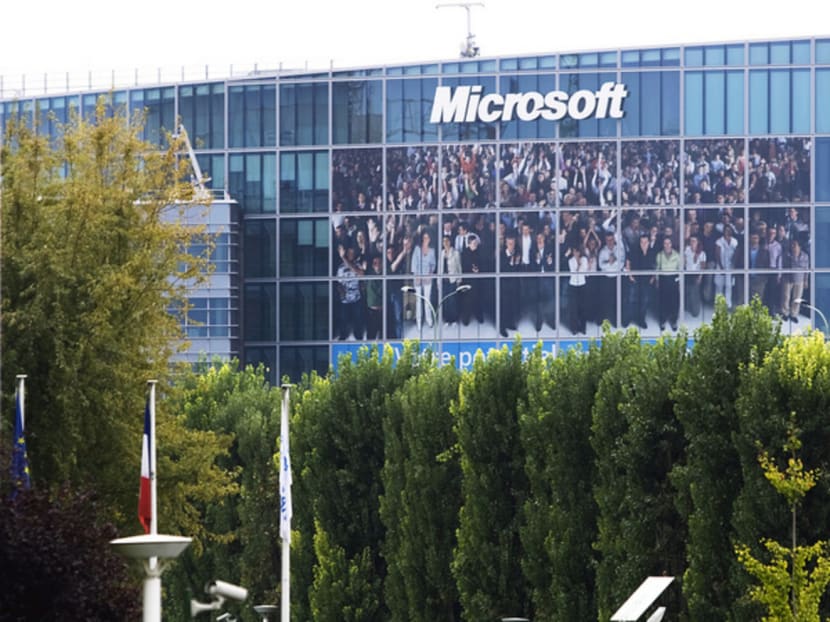France the new tax haven for technology companies
PARIS — Move over, Ireland. Companies from Microsoft to China’s Huawei Technologies scouring Europe for fiscally attractive shores are turning to an unlikely country: France. As a base for research and development (R&D) teams, that is.

The Microsoft Corporation headquarters in Issy-les-Moulineaux, near Paris. Global companies are increasingly beefing up their teams in France. PHOTO: REUTERS
PARIS — Move over, Ireland. Companies from Microsoft to China’s Huawei Technologies scouring Europe for fiscally attractive shores are turning to an unlikely country: France. As a base for research and development (R&D) teams, that is.
Tax breaks for R&D, €5.6 billion (S$9.08 billion) this year alone, combined with world-class scientists, are making France a honey pot for technology companies. As the French Parliament debates how to shrink the country’s budget deficit this month, some lawmakers are demanding reining in the R&D credits, saying some companies are abusing them. French President Francois Hollande, however, has pledged that it is a budget line he will not touch.
Ireland’s corporate tax of 12.5 per cent, less than half of France’s 33.3 per cent, ensures companies from Google to Apple keep their European headquarters in the Celtic nation. Still, for R&D, global companies are increasingly beefing up their teams in France, transforming the country into a European technology hub, mirroring the United Kingdom’s dominance in the financial industry and Germany’s manufacturing prowess.
“The research tax breaks are decisive — they make France economically more attractive,” said Mr Olivier Piou, who heads Gemalto, an Amsterdam-based developer of security products for bank cards, mobile phones and passports. The fiscal breaks offset a significant part of Gemalto’s R&D budget, making it more compelling to keep 30 per cent of its 2,000 researchers worldwide in France, Mr Piou said.
Mr Hollande boasted about the “edge” the measure gives France during a nationally televised interview earlier this month. “Often we have our handicaps, but here we have an advantage,” he said.
The jobs being created and the technological ecosystem the tax breaks are spawning is just what Mr Hollande needs as he struggles to rekindle growth and reverse record-high joblessness. The measure, introduced in the 1980s, was expanded by former President Nicolas Sarkozy. It is among the few of his predecessor’s policies retained by Mr Hollande.
More than 17,000 companies, ranging from biotechnology and energy to software and gaming, are cashing in on the tax advantages and subsidies for innovation this year in France, with an average break of about ¤323,500. The R&D tax break is France’s second-biggest behind a payroll credit, a measure to spur competitiveness, said the Budget Ministry.
The move, meant to keep the brightest minds and high-value jobs at home, is also prompting foreign companies to set-up laboratories or hire French algorithm whizzes.
Washington-based Microsoft runs a joint unit with state-backed research institute Inria, where about 100 scientists work on fundamental research.
Phone network-equipment maker Huawei plans to recruit 200 researchers by 2017 in the southern town of Sophia Antipolis.
Hiring by such companies is among the few bright spots in an otherwise grim picture in France with unemployment rising and an economy in its third year without tangible growth. Companies from carmaker Peugeot to mobile-phone service provider Bouygues Telecom are firing staff as jobs go to low-cost countries or competition forces expenditure cuts.
Against that backdrop, Prime Minister Manuel Valls in September met Huawei founder Ren Zhengfei to go over the Chinese company’s plans to invest US$1.9 billion (S$2.4 billion) on R&D facilities in France over the next three years.
Mr Ren told Mr Valls that France’s strengths in the fields of mathematics and engineering and fiscal advantages had convinced him to bolster the company’s presence in France, said a company spokeswoman in Paris.
“The fiscal context isn’t our first motivation, but of course it’s an advantage France has over other countries,” said Ms Isabelle Leung, a spokeswoman for Huawei in France.
“In order of importance, we’re here for the competency of the candidates, the ecosystem, as well as the research tax breaks.” The R&D break, called the credit impot recherche, or CIR, allows companies to shave a portion of their corporate tax.
On Nov 5, some lawmakers asked Mr Hollande to cap the CIR tax credit. Companies today can claim tax credits for multiple units. The lawmakers want to limit the break to one tax credit per company. The measure would save the state ¤530 million, the Parliament’s finance committee estimated.
As slowing growth caps government receipts, the state is making it harder to access tax breaks, said Mr Thomas Gross, associate director at Sogedev, which advises companies on getting tax breaks and financing from the government. But far from capping the tax break, the government needs to tackle other matters to unleash growth, he said.
“Yes, France is getting growth from innovation, but that’s not enough to compensate other segments of the economy slowing down,” Mr Gross said.
“High labour costs and lack of flexibility — that’s what’s weighing France down.” Bloomberg






